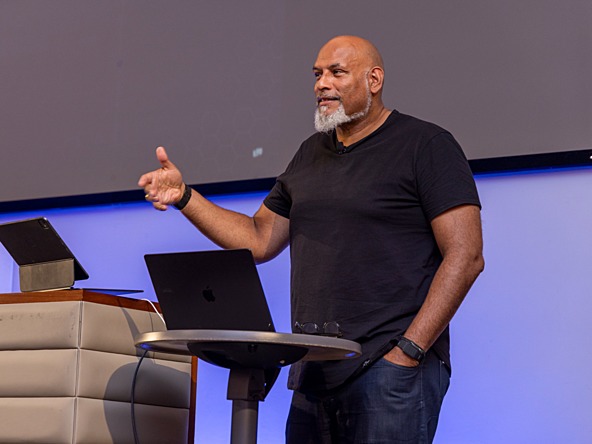‘Data is not compelling in and of itself', conference hears

Amaechi, who is professor of leadership at the University of Exeter Business School, told the conference on Thursday that researchers needed to remember that “data is not compelling in and of itself”, and that too much information can be a negative.
“People aren’t rational. But somehow we operate as if they were – we operate as if the data should be compelling,” he explained.
“It is true in the corporate world too – this glut of information by people who have very different ideas on the appropriate use, analysis and interpretation of data. Some of the research I see is in the name of things I think are important: wisdom, changing behaviour and creating clarity. But much of it isn’t.”
There also needs to be a greater focus on storytelling and how data is communicated to the outside world, Amaechi said, and specifically understanding why some people’s interpretation of information can differ greatly from that of the research team.
“If you want to understand why people don’t know or misinterpret the things you tell them, there are lots of different reasons that are cognitive biases or motivated reasoning of all kinds, but a lot of it is simply that you are talking to a different person than they are,” he added.
“You have delivered a message for who you think they are but not to who they actually are.”
Calling the insight industry “guardians of data”, Amaechi also said it was time to move away from measuring hard-to-define concepts, such as culture.
“Think about what you’re gathering and why it is important,” he said. “Think about what you’re disseminating and the messages it is sending to people.
“Use your skills to influence stakeholders so they stop asking you to measure things that are meaningless and make them somehow meaningful. Stop allowing them to measure things that are nebulous and unquantifiable in order to have a number that moves on a certain interval basis.”
Amaechi also called for researchers to stand up against misuse and misrepresentation of research findings and data.
“I think the role you play is too important for us to be neutral. Being neutral is not going to help you – ask the BBC. It is a pretend state; there are some things you know to be good, right and ethical and some things you know not to be,” he said.
“It is a profound responsibility to be custodians of data that will impact how other people are seeing.
“We need to care about what happens to the information we throw out there, to the pervasive ideas and misinterpretations we allow. I know this is not what your responsibility is, but it strikes me that you are informed in a way that other people are not and that people less informed than you are making decisions that you should be able to challenge without too much sacrifice.”

We hope you enjoyed this article.
Research Live is published by MRS.
The Market Research Society (MRS) exists to promote and protect the research sector, showcasing how research delivers impact for businesses and government.
Members of MRS enjoy many benefits including tailoured policy guidance, discounts on training and conferences, and access to member-only content.
For example, there's an archive of winning case studies from over a decade of MRS Awards.
Find out more about the benefits of joining MRS here.












0 Comments